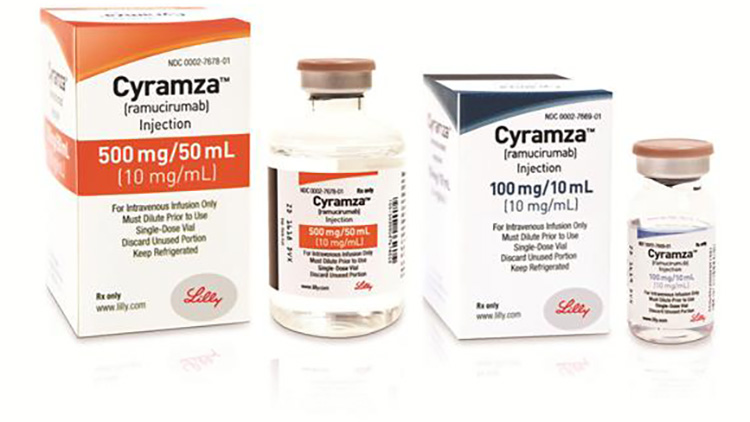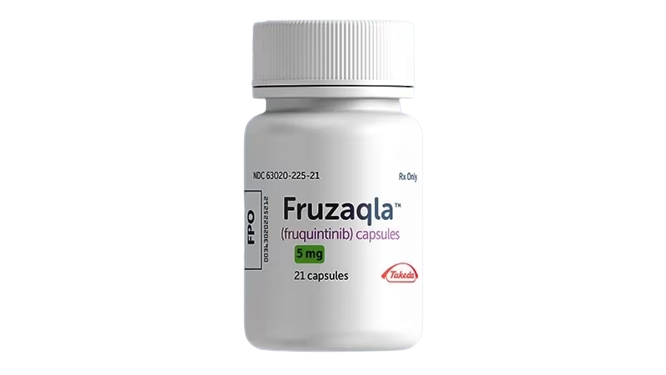Cyramza (ramucirumab) vs Fruzaqla (fruquintinib)
Cyramza (ramucirumab) vs Fruzaqla (fruquintinib)
Cyramza (ramucirumab) is a monoclonal antibody that targets the vascular endothelial growth factor receptor 2 (VEGFR2) and is used for the treatment of various types of cancer, including gastric cancer and non-small cell lung cancer, by inhibiting the blood supply to tumors. Fruquintinib is a small molecule tyrosine kinase inhibitor that selectively inhibits VEGFR, which is used primarily for the treatment of metastatic colorectal cancer in China. When deciding between Cyramza and Fruquintinib, it is crucial to consider the specific type of cancer being treated, the drug's approval status in the patient's region, and the patient's overall health profile, as these factors will influence the efficacy and suitability of the treatment.
Difference between Cyramza and Fruzaqla
| Metric | Cyramza (ramucirumab) | Fruzaqla (fruquintinib) |
|---|---|---|
| Generic name | ramucirumab | fruquintinib |
| Indications | Gastric cancer, non-small cell lung cancer, colorectal cancer, hepatocellular carcinoma | Metastatic colorectal cancer |
| Mechanism of action | Angiogenesis inhibitor by VEGFR-2 antagonism | Angiogenesis inhibitor by VEGFR inhibition |
| Brand names | Cyramza | Fruzaqla |
| Administrative route | Intravenous infusion | Oral |
| Side effects | Hypertension, diarrhea, headache, hyponatremia | Hypertension, hand-foot syndrome, fatigue, proteinuria |
| Contraindications | Hypersensitivity to ramucirumab or any component of the formulation | No data available |
| Drug class | Monoclonal antibody | Tyrosine kinase inhibitor |
| Manufacturer | Eli Lilly and Company | Hutchison MediPharma Limited |
Efficacy
Cyramza (Ramucirumab) Efficacy in Colorectal Cancer
Cyramza, known generically as ramucirumab, is a monoclonal antibody that targets vascular endothelial growth factor receptor 2 (VEGFR2), which is implicated in the growth and development of blood vessels that supply tumors. In the context of colorectal cancer, Cyramza is used in combination with FOLFIRI (irinotecan, folinic acid, and fluorouracil) for the treatment of patients with advanced colorectal cancer that has progressed on a first-line bevacizumab, oxaliplatin, and a fluoropyrimidine-containing regimen. Clinical trials have demonstrated that the addition of Cyramza to FOLFIRI can lead to an improvement in overall survival and progression-free survival compared to FOLFIRI alone, representing a valuable second-line treatment option for patients with metastatic colorectal cancer.
Fruzaqla (Fruquintinib) Efficacy in Colorectal Cancer
Fruzaqla, with the active ingredient fruquintinib, is a small molecule drug that selectively inhibits the VEGF receptors 1, 2, and 3, which are also involved in angiogenesis. While Fruzaqla is not yet approved globally, it has shown promising results in clinical trials conducted in China for the treatment of metastatic colorectal cancer. In a pivotal phase III trial, patients with metastatic colorectal cancer who had progressed after standard chemotherapy treatments showed a significant improvement in overall survival when treated with Fruzaqla compared to placebo. Additionally, the study reported an increase in progression-free survival for patients receiving Fruzaqla.
Comparative Efficacy in Colorectal Cancer Treatment
When comparing the efficacy of Cyramza and Fruzaqla in the treatment of colorectal cancer, it is important to consider that these drugs have been studied in different settings and populations. Cyramza, in combination with FOLFIRI, is an established second-line treatment for advanced colorectal cancer in many countries and has been shown to significantly improve patient outcomes. Fruzaqla, on the other hand, has demonstrated efficacy as a monotherapy in improving survival outcomes in patients who have exhausted standard treatments, with its use currently more limited geographically.
Conclusion
Both Cyramza and Fruzaqla represent important advancements in the treatment of metastatic colorectal cancer. Their mechanisms of action, targeting the VEGF pathway, provide a strategic approach to inhibiting tumor angiogenesis and growth. The efficacy of these drugs in improving survival metrics underscores their potential role in the management of colorectal cancer. However, the choice of treatment should be individualized based on patient characteristics, prior treatment history, and regional drug availability. Ongoing research and clinical trials continue to refine the optimal use of these agents in colorectal cancer therapy.
Regulatory Agency Approvals
Cyramza
-
European Medical Agency (EMA), European Union

-
Food and Drug Administration (FDA), USA

-
Health Canada

-
Therapeutic Goods Administration (TGA), Australia

-
Medsafe (NZ)

Fruzaqla
-
Food and Drug Administration (FDA), USA

Access Cyramza or Fruzaqla today
If Cyramza or Fruzaqla are not approved or available in your country (e.g. due to supply issues), you can access them via Everyone.org.
How it works

Make an enquiry
Choose the medicine you want to buy, answer a couple of questions, and upload your prescription to speed things up. We’ll get back to you within 24 hours.


Make an enquiry
Choose the medicine you want to buy, answer a couple of questions, and upload your prescription to speed things up. We’ll get back to you within 24 hours.


Breeze through the paperwork
We'll guide you through the required documents for importing unapproved medicine, ensuring you have all the necessary information.


Get a personalized quote
We’ll prepare a quote for you, including medicine costs and any shipping, administrative, or import fees that may apply.


Receive your medicine
Accept the quote and we’ll handle the rest - sourcing and safely delivering your medicine.

Some text on this page has been automatically generated. Speak to your physician before you start a new treatment or medication.
Let's talk
If you have any questions, call us or send us a message through WhatsApp or email:
Contact us




